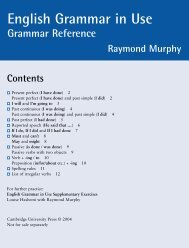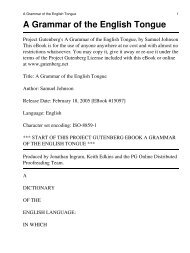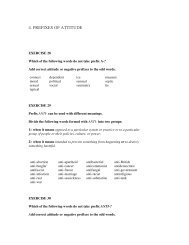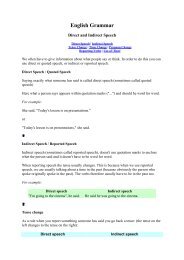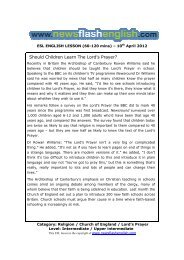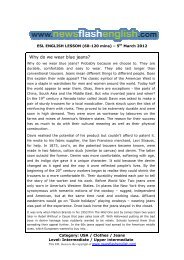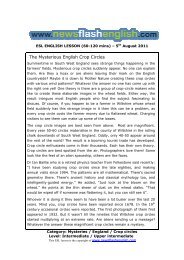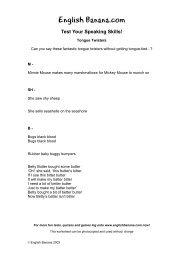TO DOWNLOAD - 75 Pages (928kb - PDF format) - ESL Teachers ...
TO DOWNLOAD - 75 Pages (928kb - PDF format) - ESL Teachers ...
TO DOWNLOAD - 75 Pages (928kb - PDF format) - ESL Teachers ...
You also want an ePaper? Increase the reach of your titles
YUMPU automatically turns print PDFs into web optimized ePapers that Google loves.
GRAMMARPresentsw i n gtaketearthrowwearweavewringwritePastswungtooktorethrewworewovewrungwrotePast ParticipleswungtakentornthrownwornwovenwrungwrittenHE Tense and moodA verb shows the time (or tense) of the action by changingits form. A conjugation is an intact list of all theforms of a verb by mood, number, person, tense, andvoice. A synopsis is a summary of these forms in onlyone person, as displayed below for the verb tell.Each verb form expresses a different shade of meaning,Simple forms show the everyday norm; progressiveforms indicate action in progress at any particular time;emphatic forms add a degree of emphasis, and are mainlyused in questions. The imperative mood issues commands("Tell us the answers"). The subjunctive moodindicates wishing ("I wish it were being told now"), acondition contrary to fact ("If the story were told now,there would be a riot"), and sometimes urgency ("Theyinsist that they be told the facts now").TensePresentPastFutureINDICATIVE MOODActive Voicethey tellthey toldthey will tettPresent perfect they have toldPast perfectFuture perfectTensePresentPastFuturePresent perfectPast perfectFuture perfectTensePresentPastthey had toldSimple Formthey will have toldProgressive FormActive Voicethey are tellingthey were tellingthey will be tellingthey have been tellingthey had been tellingthey will have beentellingEmphatic FormActive Voice Onlythey do tellthey did tellPassive Voicethey are toldthey were toldthey will be toldthey have been toldthey had been toldthey will have beentoldPassive Voicethey are being toldthey were being toldthey will be toldthey have been toldthey had been toldthey will hove beentoldIMPERATIVE MOODUsed only in the second person, present tenseActive Voice(you) tellSUBJUNCTIVE MOODSimple FormPassive Voice(you) be toldTense Active Voice Passive VoicePresentPastFuture(if) they tell(if) they told(if) they will tellPresent perfect (if) they have toldPast perfectFuture perfect(if) they had told(if) they will have told(if) they be told(if) they were told(if) they will be told(if) they have beentold(if] they had beentold(if) they will havebeen told11 F Tense, shift in tenseA verb in a subordinate clause should relate logically intense to the verb in the principal clause. Avoid anyunnecessary shift.INCORRECT:As the wedding began [past], the bride's motherstarts [present] to cry.CORRECT:As the wedding began [past], the bride's motherstarted [past] to cry.INCORRECT:He had intended [past perfect] to finish his thirdnovel by the end of the year, but he has been verysick [present perfect] until Thanksgiving.CORRECT:He had intended [past perfect] to finish his thirdnovel by the end of the year, but he had been verysick [past perfect] until Thanksgiving,INCORRECT:By the time the fire fiad been extinguished [pastperfect], the priceless paintings had beendestroyed [past perfect],CORRECT:By the time the fire was extinguished [past], thepriceless paintings had been destroyed [pastperfect], (The past perfect expresses action thattook place before the simple past.)Because tense indicates the time of the action and voiceindicates whether the subject is the agent of the action(active: Tom saw) or the recipient of the action (passive:Tom was seen), both of these verb forms are central tothe consistency of a sentence or passage.20




